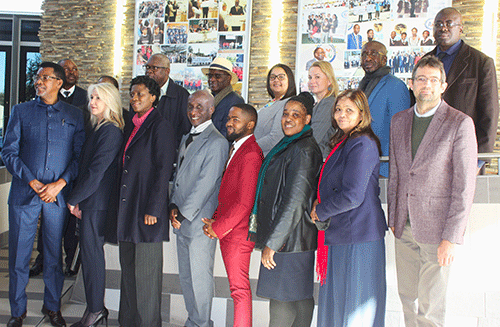Media ombudsman John Nakuta has lambasted the mandatory SIM card registration by the Communications Regulatory Authority of Namibia, branding it retrogressive in the anti-graft fight, as it will leave whistleblowers exposed.
Nakuta called on the national anti-graft body – the Anti-Corruption Commission (ACC) and key stakeholders – to sit around the table in earnest to iron out issues arising from the registration of SIM cards.
In Nakuta’s eyes, it defeats logic to have the Whistleblowers Act, albeit in its dormancy on one hand and compulsory registration of SIM cards on the other.
“Lawmakers do not seem to appreciate the role of the media in fighting corruption. Look at what CRAN is doing now with the registration of SIM cards and the whistleblower law on the other side. There is no synergy,” Nakuta said.
“Who would want to blow the whistle if your identity is known – when somebody is listening to your conversations? These are conflicts of roles and one hand doesn’t know what the other hand is doing.”
The media ombudsman pointed to complex cases, such as the Fishrot scandal – in which State resources were stolen at an industrial scale and the State capture in neighbouring South Africa – as some classic examples of why the identities of whistleblowers and investigative journalists must be protected. “The media is key in fighting corruption. The Fishrot case and the arrest of two ministers (Sacky Shanghala and Bernhard Esau) came as a result of investigative journalism and whistleblowing. If you look at how the Zondo commission started, there are traces of the media,” he said. Nakuta was speaking at the commemoration of Africa’s Anti-corruption Day, which aims to prevent and combat corruption as envisioned by Agenda 2063.
The theme of this year’s event is ‘Strategies and Mechanisms for the Transparent Management of Covid-19 Funds’.
CRAN, however, has on numerous occasions defended its stance to register and verify all active SIM card owners.
The authority has since gone on a national awareness drive to ensure the gospel is heard across Namibia’s length and breadth.
“Operators will have a period of 12 months to conclude the registration of existing customers. The information of new customers must be registered within three months from the date of sale. Unregistered SIM cards will be deactivated,” CRAN’s CEO Emilia Nghikembua was recently quoted.
Cran’s position is informed by best global practices. According to CRAN, the registration is used to address antisocial behaviour, provide age verification and assist in addressing mobile fraud.
It is also a tool that eases and enables digital surveillance and interception as part of investigations of offences.
NAMPU
Another panellist on the day was veteran journalist and deputy secretary general of the Namibia Media Professionals Union (NAMPU) Jemima Beukes.
While going a step further, Beukes echoed Nakuta’s sentiments.
She said NAMPU’s registration with the labour commissioner is cumbersome and affects the work of journalists.
“The union applied for registration in 2020. But since then, it has been a back-and-forth process, where our constitution is being sent back because of simple punctuation marks and not substance. This affects the work of journalists in fighting corruption because, without a registered union, they are on their own,” said the unionist-cum-journalist.
Beukes added the access to information law that has been in the making for over half-a-decade now is long overdue.
Censorship
Adding his voice to the debate, Hugh
Ellis, a media professor at the Namibia University of Science and Technology (NUST) lamented the censorship of the media as a key impediment in fighting corruption. “How far can the State-owned media go?” he questioned.
Ellis called for more independent media institutions. NAMPU, he said, can play a vital role as a union to protect media independence.
He also accused big corporations of censoring media houses that rely heavily on them for funding.
“Let us look at diverse funding models as opposed to traditional advertising,” he said.
“State-funded media institutions suffer from self-censorship, and it reflects badly on the media,” Nakuta said.
Meanwhile, political analyst and Institute for Public Policy Research (IPPR) executive director Graham Hopwood said they play a crucial watchdog to combat
corruption. But they are under-resourced and under-capacitated. “We simply don’t have the resources,” he said, adding there is no grassroots level work by civil society organisations, while many are now either dormant or defunct.
IPPR is in the process of establishing an anti-corruption arm, Integrity Namibia.
- emumbuu@nepc.com.na


